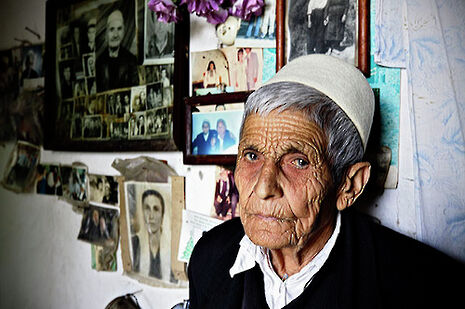The Law of Kanun
Aurelien Gueroult discusses the dark inspiration behind his upcoming radioplay

Albania is an intriguing country. It is one of the few countries in Europe with a Muslim majority, having spent almost five centuries under Ottoman rule. In more recent history it suffered forty years of atrocities under the ruthless Enver Hoxha’s Marxist-Leninist regime. Albania also has its own internationally present mafia, which according to estimates, controls more than 75 per cent of the UK’s brothels and is also involved in the heroin trade. And Albania has the Kanun.
The Kanun is a code of law, attributed to Lekë Dukagjini, a 15th century nobleman known as the Angel Prince, and upheld by the tribes of Northern Albania. These tribes were never completely subdued by the Ottomans; they remained largely Christian and kept the Kanun as their law, orally transferring it for centuries. In 1913 a Franciscan priest started the first transcription of the Kanun which was published in 1933. In its twelve books the Kanun deals with every aspect of daily life, but it’s eighth book is the most central - the eighth book is entitled 'honour'.
The words Nderi and Besa are both translated as honour, but are subtly different. As far as I understand it, Nderi refers to an individual’s personal honour while Besa is a sacred principle that transcends life itself. Besa is an authentic and untranslatable Albanian concept to which the word honour cannot do justice. It is an inviolable precept, which according to the Kanun, dictates every human relationship. When a man loses his Besa, his family is shamed and is no longer part of normal society. Indeed the Kanun states that "stolen honour knows no atonement. It cannot be forgiven. Stolen honour can only be restored by the shedding of blood." If a shamed man had a drink in a bar, he might find a bullet at the bottom of his glass as a reminder of what he must do. The Kanun also states that "the blood spilt will be erased once the blood owed is retaken." Thus the Kanun encourages 'gjakmarrias' or blood feuds, where warring families kill each other over several generations. Whole families lived in fear of feud reprisals, never leaving the safety of their homes. There even used to be ‘safe houses’, places where feuders could sequester themselves, hiding from avengers.
One would hope the Kanun’s feudal code has been long forgotten, buried in the depths of time – unfortunately it has not. For many people in Albania today, blood feuds are a reality. Hoxha’s communist regime suppressed the Kanun to some extent, but after its fall in 1990 and the ensuing chaos, the Northern tribes-people fell back on the Kanun and it became the only respected law. Today, it is estimated that 3000 people involved in blood feuds live confined in their homes and that since 1990 ten thousand have been killed. To make things worse, the mafia have got involved; often peace negotiators in these feuds are none other than the local godfathers.
I first came across the Kanun in Guillaume Herbaut’s striking photo report for the French magazine XXI. The emotional strength of some of his photos are staggering. Two brothers are portrayed gazing out of a window; aged eight and ten they have never left their homes, they have never gone to school, nor have they any contact with the outside world. In another photo, a girl of ten is pictured with a kitchen knife; all the males in her family have been killed and the blood feud now rests on her shoulders.
Out of a sense of horror and fascination, I was inspired to write a short story about the Kanun which has since morphed into a radio play which will be broadcast on CamFM later this term. The Law of the Kanun follows the life of Liridon Dragusha, a young man who is caught up in a blood feud at the death of his father. The family’s honour is lost and the Kanun states Liridon must avenge his father to regain it. Liridon must kill or remain shamed. It would be a lie to say that my radio play is an attempt to raise awareness about the Kanun, it was a far more self-indulgent project. The truth remains however, that the Kanun has claimed thousands of lives across the centuries and continues to be a huge problem in modern day Albania. But what solutions are there? The Kanun is so engrained in the mentality of these people; it is part of their identity. A return to Communism isn’t the answer… Does the Albanian government even have the means or expertise to tackle such a deep-rooted issue? Why aren’t we helping? How is it possible that most of us have never heard of the Kanun and its huge casualties? Or is it just that Albania is one of those countries excluded from our narrow Western vision of the world, about which we know little more than its name.
Aurélien Guéroult’s The Law of the Kanun will be broadcast as part of Cambridge Shortlegs presents… on CamFM 97.2, on Sunday 16th November at 5 o’clock.
 News / Report suggests Cambridge the hardest place to get a first in the country23 January 2026
News / Report suggests Cambridge the hardest place to get a first in the country23 January 2026 Arts / Exploring Cambridge’s modernist architecture20 January 2026
Arts / Exploring Cambridge’s modernist architecture20 January 2026 Comment / The (Dys)functions of student politics at Cambridge19 January 2026
Comment / The (Dys)functions of student politics at Cambridge19 January 2026 Theatre / The ETG’s Comedy of Errors is flawless21 January 2026
Theatre / The ETG’s Comedy of Errors is flawless21 January 2026 News / Write for Varsity this Lent16 January 2026
News / Write for Varsity this Lent16 January 2026









